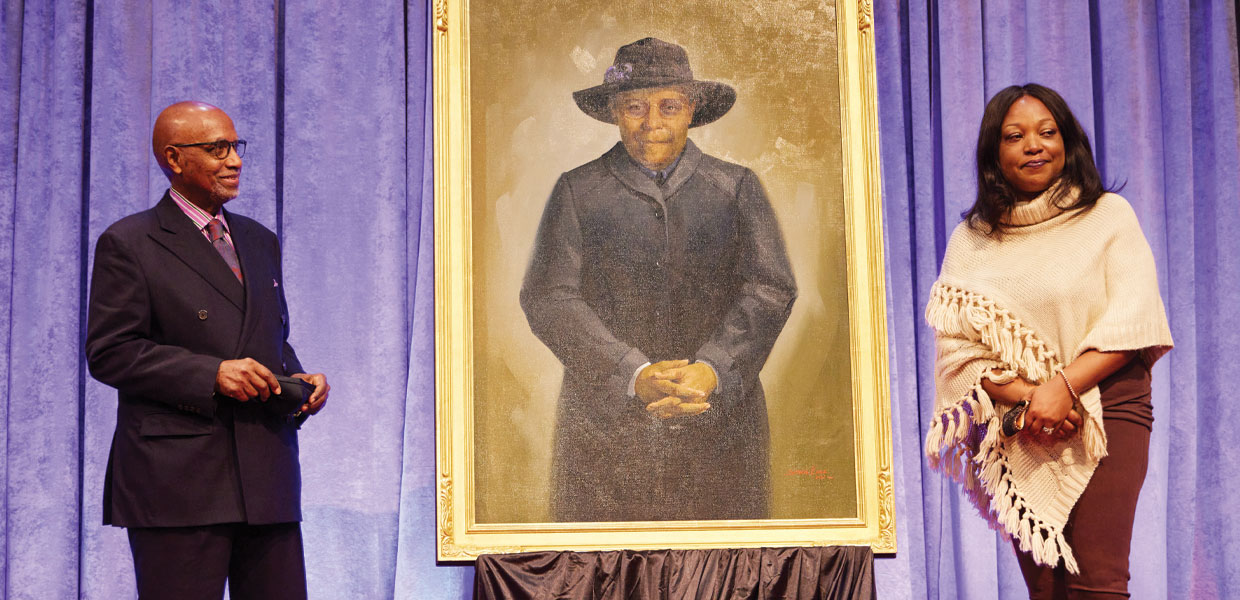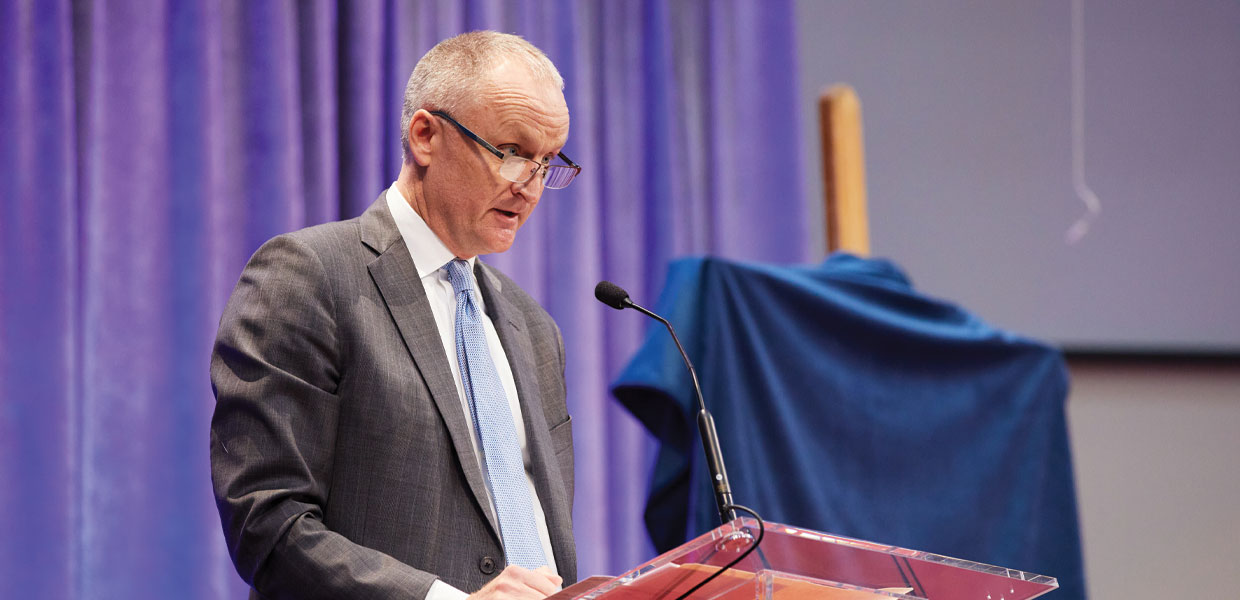
Photo Provided by Adventist HealthCare

December 10, 2021 was a momentous day for the Seventh-day Adventist Church, Adventist HealthCare (AHC), and distinguished Historically Black Colleges and Universities (HBCUs), as the life and legacy of Lucille “Lucy” Byard was both recognized and honored. Lucy Byard was a Black Seventh-day Adventist member who was turned away by the Washington Sanitarium in 1943 because of the color of her skin.
Adventist HealthCare leaders unveiled a commissioned portrait of Byard on December 10, as well as a series of significant scholarships in her name that will benefit nursing students at each of the three universities.
The event brought together various church, healthcare, and community leaders and representatives to acknowledge the decades-old indignity and to move toward healing and reconciliation by owning the wrong and taking committed action to ensure it never happens again. “I’m really proud today to be a part of the Columbia Union, and part of a healthcare system that recognizes it’s time to set the record right,” said Dave Weigley, Columbia Union Conference president, and chair of the Adventist HealthCare board.
G. Alexander Bryant, North American Division president, echoed those thoughts via a special video message. “To come together in recognition of Lucy Byard, who symbolizes the experience of so many African Americans, to commend her life and legacy is extraordinary,” commented Bryant, “especially in a day and age of so much divisiveness and so much racial insensitivity and so much inequality.”
“The recognition of Lucy Byard,” added Ted N.C. Wilson, president of the General Conference of Seventh-day Adventists, “is an important step in helping people understand that Seventh-day Adventists, not just the institution, but all of us, must truly follow in the steps of Christ and understand what it means to offer respect and dignity to all.”
A Catalyst for Change
Lucy Byard was a devout Seventh-day Adventist woman who by 1943 had developed liver cancer together with cachexia, known also as “wasting disease.” Wishing to be treated in a Seventh-day Adventist hospital and, with an introduction from a renowned church leader, Byard traveled with her husband James from her home in Jamaica, Long Island to Washington Sanitarium in Takoma Park, Maryland — the first of the hospitals that now make up the Adventist HealthCare system.
As told by Adventist historian Benjamin Baker, upon arrival, staff members of the Washington Sanitarium became aware of the fact that Byard was Black. It was determined that because of the color of Lucy’s skin, she could not receive the care she needed at Washington Sanitarium, and arrangements were made to have her transferred to Freedman’s Hospital, approximately six miles away.
Byard was treated at Freedmen’s Hospital, now Howard University Hospital. She died some 38 days later.
There is general agreement within the Adventist Church community that Byard’s mistreatment was a key catalyst that sparked the creation of Black-led regional conferences.
Leading the Way to Acknowledgment and Reconciliation
For Terry Forde, president and CEO of Adventist HealthCare, learning that a Black woman had been turned away from a healthcare facility he now leads, was both eye-opening and heartbreaking. August 12, 2016 was “a day I always will remember,” shared Forde. “It was three years before White Oak Medical Center opened its doors and relocated from Washington Adventist Hospital in Takoma Park, Maryland, that I learned that our mission, my mission, one that we hold in great esteem close to our hearts — to my heart — wasn’t able to reach everyone in 1943.”
That moment of realization led Forde to assemble the Lucy Byard Advisory Committee, composed of church, community, and healthcare-system leaders, and invited them to consider how best to honor the life and legacy of Lucy Byard, for herself but also as a talisman for every person of color who experienced then or experiences today inequity and indignities.
Advisory Committee Recommends Portrait and Scholarship
The committee’s work resulted in two recommendations: commission an original portrait of Byard and create a series of three scholarships in the name of Lucy Byard for outstanding nursing students with limited financial means. In the scholarships’ inaugural year, 2022, Adventist HealthCare will work closely with three universities, Oakwood University in Alabama, Washington Adventist University in Maryland, and Howard University in Washington, D.C., to identify candidates.
AHC has pledged $500,000 in scholarship funds over five years, with the goal of establishing an ongoing endowment.
National Search Leads to Respected Portrait Artist and Niece of Lucy Byard
“The Lucy Byard Advisory Committee had many great ideas, but one in particular gained traction,” explained Anthony Stahl, president of White Oak Medical Center (WOMC), who chaired the committee. “It was the idea of commissioning a portrait of Lucy Byard that could hang in the most highly trafficked area of the hospital … a place where patients, family members, staff, guests would stop, look, reflect, and wonder who is this person, and then read her story.”
Finding just the right artist fell to Rob Jepson, chief operating officer of WOMC. Jepson eventually identified Simmie Knox, the first Black artist commissioned to paint a portrait of a sitting U.S. president, as the best and most fitting choice. Knox’s paintings of President William Jefferson Clinton and First Lady Hillary Rodham Clinton today hang in the White House. Portraits of such notable figures as Thurgood Marshall, Henry (Hank) Aaron, Oprah Winfrey, and Ruth Bader Ginsburg are among his body of historic work.
Knox, now 86 years old, grew up in the Jim Crow South and knew the pain of discrimination, but persevered and earned a rightful place among the great artists of the 20th and 21st centuries. Working from only two existing — and very low resolution — images of Byard, Knox had to “read the details … from the shadows” to bring Lucy Byard and her story into the light. He explained that portraits make a special statement. He wanted to capture “the church lady,” her piety and her humanity. “It’s the details that create a portrait. Portraits make a special statement,” said Knox. “They say you are special. And this portrait, I think, will be viewed and in a place where it will be seen by many. And, I think it’s a moment of healing.”
Stahl also felt it important to find a living relative of Lucy Byard so her family would be aware that Byard’s story was being commemorated and immortalized. The initiative proved challenging since Byard did not have children of her own. Walter Hawkins, WOMC director of security and a seasoned genealogist, eventually found an older brother who had had children, which led to Lisa Sweeney Walker, Lucy Byard’s great-great-grandniece.
“I just recently learned of Lucy’s story, and I transported myself back to that time and I could not imagine the challenges that she faced and what she was going through,” said Walker, who has a strong physical resemblance to her ancestor. “From the bottom of my heart and on behalf of my family, I thank all of you for putting this together.”
Recognition Service Both Solemn and Joyful
Attendees characterized the recognition event as both solemn and joyful, filled with shared histories and stories, speeches, music, and prayer. Many invited speakers recounted their own experiences during an earlier time when people of color were routinely disenfranchised and disrespected, while expressing hope for the future.
John Sackett, AHC’s chief operating officer, concluded the service by praying, “Today, we have manifested our desire to reconcile this hurtful moment from the past and to once again commit to serve wholeheartedly those who have been undervalued. Please, dear Lord, bless and strengthen our resolve to never again turn anyone away that needs our care, to always respect and value every person. Let this beautiful portrait of Lucy Byard and the scholarships we award serve as a symbol and reminder of our resolve.”
Reprinted with permission.
Southern Union | February 2022



Comments are closed.